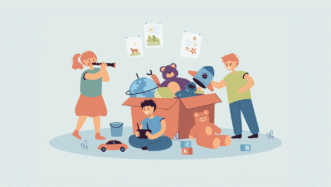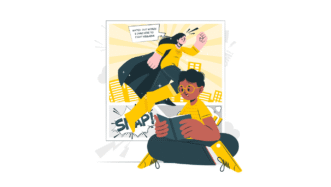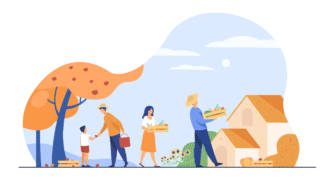LESSON OVERVIEW
The main objectives of this ESL lesson on gossip are to:
- discuss gossip from different perspectives;
- listen to an excerpt from a podcast on why people gossip;
- practise phrases related to gossip.
With this lesson, students talk about the role and social impacts of gossip. They share their views, listen to part of a podcast about why people gossip and talk about how bad situations involving gossip can be. Students explore types of gossip, express what they would do in various situations and role-play conversations. They can also do an extra vocabulary activity to work with gossip-related phrases (e.g. keep something under wraps, dish the dirt on).
C1 / Advanced45 min
60 minSpeaking ClassUnlimited Plan
This is a Speaking Class worksheet. It includes a variety of tasks that let your students practise their speaking skills. This lesson format does not focus on grammar or vocabulary. Learn more about it here.
WARM-UP AND PODCAST
This ESL lesson on gossip begins with a warm-up. Students look at words (gossip, myths, news and stories) and decide which one is odd. At this point, they can do a vocabulary activity to help them with the lesson discussions. Students choose words to complete sentences and create phrases related to gossip (e.g. a little bird told me, spill the tea about, rumour has it that). They then match them with their responses to create dialogues. After that, students choose statements about gossip and its social impact and say if they agree with them. They also add details. Next, students listen to an excerpt from a podcast about why people gossip. They choose points about personal reflection (e.g. something you could relate to, something that surprised you) to talk about in more detail. Then, students discuss questions about the role of gossip in social dynamics.
DISCUSSION AND ROLE-PLAY
In this part of this ESL lesson on gossip, students look at pairs of alternatives of gossip scenarios (e.g. working in an office where everyone openly gossips OR working in an office where gossip happens secretly). They choose the alternative they think is worse and explain why. Following that, students look at different types of gossip (celebrity gossip, family gossip, political gossip). They do tasks where they give examples, think of negative consequences and discuss which situations might be acceptable. Afterwards, students decide what they would do in situations related to ethical dilemmas in gossip (e.g. joining or staying quiet in workplace gossip). Finally, they work in pairs. Students get a card with a situation. They role-play the situation using phrases related to gossip (A little bird told me…, Come on, spill the tea about…, Rumour has it that…). Students swap roles for each new situation.
WORKSHEETS
Subscribe to unlock these and many other Standalone lesson lesson plans with the Unlimited plan
Subscribe












Oh, nice!
Thank you so much for the comment! 🙂
Spill the beans is far more common than spill the tea to be honest. Maybe it’s different in America.
Good worksheet though
Thank you so much for the comment! We opted for ‘spill the tea’ because its meaning has more to do with gossip (share gossip or reveal interesting news) and is widely used on social media. ‘Spill the beans’ has more to do with revealing a secret, hence our choice.
Interesting. I’ve never heard anyone say spill the tea in Scotland but maybe it’s a Gen Z thing.
In the states I often hear “What’s the tea?” more than anything else!
Interesting. I have never heard anyone say it in the UK.
Hello! American TEFL teacher here. I hear “spill the tea” more frequently, but “spill the beans” is a common phrase too.
I can’t ffind the answers to the last exercise (on teacher version), am I missing something?
Hi there! The key to the last exercise is included in the teacher note after ex. 1.
A great lesson and a very interesting topic. However, my students and I came to the conclusion that we feel uncomfortable gossiping and even if there are advantages to gossiping, we try to avoid it 🙂
Therefore, I added phrases to respond to gossip in a natural, polite but firm way, e.g. “I’d rather not comment on this.”“I don’t feel comfortable talking about other people.” etc
Thank you
Thank you for sharing your feedback! We’re trying to make our lessons more universal to cater to the needs of a wide range of classrooms, but we also welcome teachers adjusting the lessons to suit their students’ needs. We’re always happy to hear about examples of such adjustments 🙂